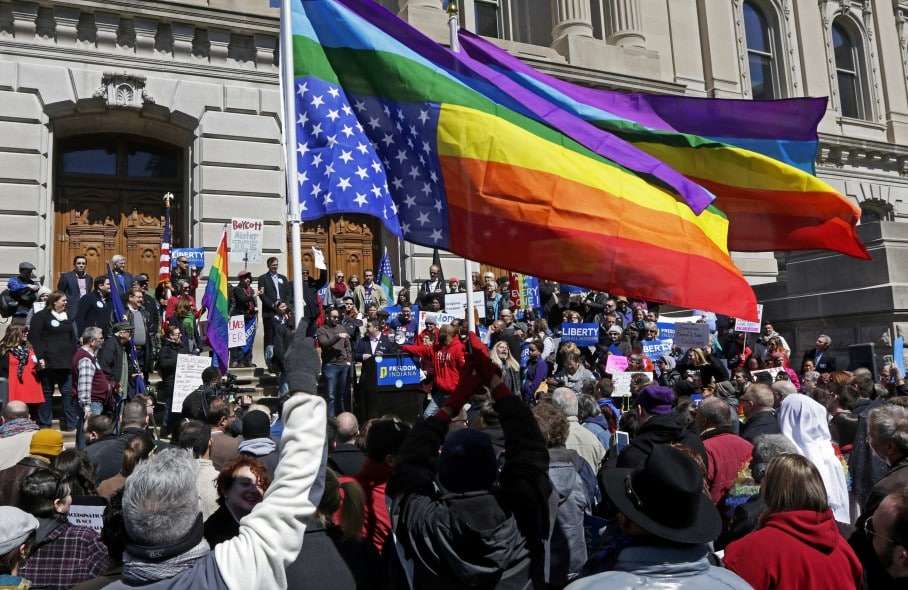Religious exemptions, RFRA carveouts, and "who decides?"

A few quick thoughts on the recent debate about religious exemptions. (If you want much less quick thoughts, I have those too.)
1. The popularity of religious exemptions: Most Americans, I think, support the existence of some religious exemptions (especially if they're also extended, as some are, to conscientious philosophical objectors). Certainly some such exemptions have been common throughout American history - the conscientious objector exemption from the draft, sacramental wine exemptions during Prohibition, the clergy-penitent privilege, religious exemptions from government institutions' dress codes, no-headgear rules, and no-beard rules, and more. It's a good idea to ease the burden of generally applicable rules when that burden is felt unusually keenly by some people, and when easing the burden imposes few costs on others or on the legal system. And that's so for practical reasons (less friction among religious groups) as well as for reasons of sympathy with those who are being burdened.
2. The limits of religious exemptions: Yet surely religious exemptions can't always be granted, and there can't even be a very strong general rule of granting such exemptions (much as there is a strong rule against the government banning speech because of its content, at least outside traditionally recognized exceptions). There can't be religious exemptions from laws banning murder, rape, theft, trespass, libel, and the like. There probably shouldn't be such exemptions, at least outside narrow zones, from tax law, copyright law, employment law, and more.
I might firmly believe that God wants me to do something. But that can't give me the power to invade your legally recognized rights, or even sharply undermine your interests that the legal system seeks to protect. (You can also frame this, as the law often does, in terms of whether the exemption would undermine government interests - but, directly or indirectly, those government interests come down to attempts to protect the rights and interests of actual people.) Much of the time, though not all of the time, the answer to a religious exemption request is, "granting this request to you would unduly interfere with the rights and interests of others." And the exemption principle is thus not "always grant religious exemptions" or even "usually grant religious exemptions," but something like,
Grant religious exemptions when they don't unduly burden the rights and interests of others.
3. Who decides? But who turns this vague principle into concrete legal rules? Who decides what counts as a right or important interest, who gets to predict how much an exemption would interfere it, and who decides how much interference is too much?
As I've discussed elsewhere, there have been three answers to this question in American history:
a. The old, pre-1963 approach was "legislatures." Legislatures could decide when an exemption from a particular law (draft law, Prohibition, etc.) should be granted, and when granting it would be too burdensome on others. Of course, that decision wouldn't even take place until the question was put on the legislative agenda, usually because the group seeking the exemption was large enough, vocal enough, popular enough, or some mix of the three.
b. From 1963 to 1990, the "Sherbert/Yoder rule" - largely advanced by Justice Brennan and other liberal Justices, though often joined by moderates and moderate conservatives as well - was "the courts, plus legislatures that wanted to grant exemptions." Religious exemptions were a presumptive constitutional entitlement. Courts would decide when to grant them and when not to. Legislatures could also grant many exemptions by statute (including exemptions that courts weren't willing to recognize themselves), but they couldn't deny exemptions when courts granted exemptions. This is still the rule in about a dozen states that have interpreted their state constitutional religious exemption provisions as following the Sherbert/Yoder model.
c. Under the RFRA model, though, the answer is "the courts, plus legislatures that want to grant or deny exemptions." Because RFRAs create a generally available presumptive exemption regime, courts can use them to grant exemptions. But because RFRAs are statutes, legislatures can exclude certain government rules (such as anti-discrimination laws) from the scope of RFRAs. And they can also grant exemptions that courts wouldn't, as well as deny exemptions that courts would grant (or might grant). The legislatures thus have the final say on when an exemption is too burdensome to be granted.
4. Anti-discrimination law carveouts: Whether a particular religious exemption would unduly burden third parties' rights and interests is thus, under the RFRA regime, a question both for the judicial process and for the political process (and the political process trumps, given the legislature's ability to exclude statutes from the scope of RFRA).
When people are demanding that anti-discrimination laws be carved out from a state RFRA, they are thus, in effect, saying,
We have considered whether an exemption from anti-discrimination laws would unduly burden the rights and interests of others. We think it does. Others - including future judges applying a RFRA - might think it doesn't, but that's because they take a different view than we do about rights to not be discriminated against. But the political process ultimately gets to make this value judgment, and we want to push the political process into deciding that no exemptions are allowed.
They are thus making much the same judgment as courts would when applying a RFRA (though, to be sure, not in the legalese terms of least restrictive means and compelling government interests). But they want their judgment to prevail, rather than risking that courts will reach a different judgment.
One can agree or disagree with this judgment, based on one's own view of the importance of anti-discrimination laws (an importance that might well vary by context). But the ability to make this political judgment, I think, is an inherent and valuable part of the RFRA approach to religious exemptions - an approach that, as I said, includes both the judicial process and the political process - and not something inconsistent with that RFRA approach.
